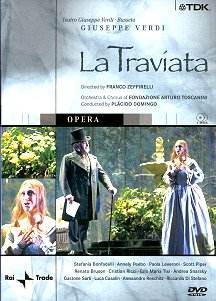This Zeffirelli production of Verdi’s ever-popular,
melodic opera was filmed in February 2002, in Busseto, near Parma, Italy,
close to the composer’s home and birthplace. Zeffirelli had filmed La
Traviata before, in 1982. The Italian film director whose credits
include: The Taming of the Shrew (1966); Romeo and Juliet
(1968); Jesus of Nazareth (TV) (1977); Othello (1986);
and, more recently, Tea with Mussolini (1999), began his professional
career as a stage director.
The story of the opera concerns the plight of Violetta
a mid-19th century Parisian courtesan who is dying of consumption
(tuberculosis). She responds to the ardent love of the young Alfredo
but sacrifices him when his father, Giorgio pleads that their love will
ruin his daughter’s happiness and his son’s career.
Leaving the musicality of the opera to conductor, Plácido
Domingio, Zeffirelli is here concerned with a natural expression of
Verdi’s opera – and Alexander Dumas (fils)’ story. Thus Zeffirelli
directs the set designs, lighting, costumes as well as the acting. (One
of this DVD’s features demonstrates his remarkably detailed knowledge
of the costumes of the period.)
Seldom has this melodrama seemed so sincere, so true.
Stefania Bonfadelli as Violetta really does look consumptive. Zeffirelli
coaxes finely shaded, subtle acting from her to match her considerable
vocal talents - her finely tuned expressiveness as she passes through
enthusiastic indulgence in Parisian society’s hedonistic pleasures,
through initial cynical doubt about the sincerity of Alfredo’s love,
to submission to headlong passion, to stoical acceptance that she must
lose him, and despair and desperation to recapture his love as death
approaches. She is particularly impressive through the demands of Act
III in which she scarcely ceases singing. The acting of American tenor,
Scott Piper, gains stature as the production progresses. This is after
a rather hesitant opening introducing the famous drinking song, the
‘Brindisi’. He portrays Alfredo as rather unhealthily impulsive and
obsessive. Veteran Renato Bruson as Giorgio Germont is a commanding
presence and his Act II aria ‘Di Provenza il mar’ draws prolonged applause.
Domingo has sung in sixteen Verdi operas and has conducted twelve. He
brings a valuable singer’s insight into his expansive and vibrant musical
direction.
Zeffirelli’s stage direction insists that the chorus’s
movements must be logical and realistic as though little acts of teasing
and passion were progressing in the ballroom and party scenes and in
the colourful Act III merrymakers’ scene where gypsies sing to Spanish
rhythms complete with castanets and tambourines. The beautifully lit
sets make best use of the stage with a rotating middle section and soft
gauzy drapes. Stiffer translucent material allows maximum spatial and
perspective effects.
The DVD’s features cover all aspects of the production
in some detail. Zeffirelli is shown visiting the Verdi’s house. Domingo
and Scott Piper are interviewed. He and Bonfadeli are shown in rehearsal.
There is much more.
Zeffirelli’s La Traviata is a feast for the
eye and Domingo draws first class performances from his orchestra, chorus
and cast – particularly Stefania Bonfadeli who is outstanding – a most
appealing and sympathetic Violetta. Renato Bruson is a proud yet ultimately
human Giorgio Germont. Above all there is Verdi’s gorgeous music, one
beautiful melody flowing on from another
Ian Lace
